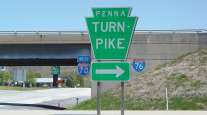Staff Reporter
Connecticut House Democrats Propose Trucks-Only Tolls for Transportation Funding

[Stay on top of transportation news: Get TTNews in your inbox.]
Leading Democratic lawmakers in the Connecticut House of Representatives have responded to Gov. Ned Lamont’s transportation investment plan with a proposal to toll only trucks.
Lamont’s transportation plan, titled CT2030 and presented Nov. 7, outlines $14 billion in investment for roads and bridges, and $7 billion for public transportation. The plan proposes “user fees,” collected through electronic overhead gantries, to partially support the investment.
#CT2030 is a plan to transform Connecticut's transportation system to reduce congestion and make travel quicker, safer, convenient, and reliable.
This includes improvements to our:
Roads
Trains
Buses
Airports
Ports
Check out the plan at https://t.co/lh90R1Veut pic.twitter.com/KSS1rC0E18— Governor Ned Lamont (@GovNedLamont) November 7, 2019
According to the governor’s plan, revenue would support 14 bridge projects and fund other transportation improvement projects. The tolls would be located at the sites of the 14 projects and would levy a fee on cars and trucks.
House Speaker Joe Aresimowicz (D-Berlin) and House Majority Leader Matt Ritter (D-Hartford) released a proposal Nov. 19 asking Lamont to consider trucks-only tolls on 12 of the 14 sites outlined in CT2030. Tolling at the other two locations — State Route 9 and the parkways that carry SR 15 — would be scrapped.
“We have to fix our transportation system. Our proposal is to toll trucks and to toll them permanently,” Ritter said during a news briefing Nov. 19. “Our argument is they do 80% of the damages, and it’s probably worse on bridges. To us, that’s a rational argument for asking them to pay a fee versus passenger cars.”
According to Ritter and Aresimowicz’s proposal, trucks-only tolling could raise $150 million every year.

Lamont
Connecticut’s infrastructure has room for investment. The state earned an overall C- on the American Society of Civil Engineers’ most recent report card, which came out in October 2018.
Ritter noted the concept of trucks-only tolling hasn’t received the same level of pushback that tolling cars has generated. Connecticut hasn’t had tolls in place since the late 1980s.
Lamont’s transportation plan has faced substantial challenges since he was elected in 2018; specifically, tolls have been a point of contention. Initially, Lamont proposed tolling only trucks, but shifted away from that plan in February. In March, Connecticut lawmakers spent 11 hours peppering transportation officials with questions and listening to public input on Lamont’s proposal for electronic tolls.
Motor Transport Association of Connecticut President Joe Sculley has been a staunch opponent of the tolls. Connecticut’s neighbor, Rhode Island, has a trucks-only tolling program that has stoked the ire of the trucking community. American Trucking Associations, Cumberland Farms Inc. and M&M Transport Services Inc. filed a lawsuit in July 2018 contesting the constitutionality of trucks-only tolls. The U.S. District Court of Rhode Island dismissed the suit in March, a decision that ATA has appealed. New England Motor Freight also was part of the lawsuit but has since declared Chapter 11 bankruptcy protection and shut down operations.
There is nothing fiscally responsible about tolls. Not one aspect of it. — Joe Sculley (@JRS_CT) November 15, 2019
In a response to the House Democrats’ proposal, Lamont said he appreciates the contribution and looks forward to meeting with Senate leaders and House Republicans “as soon as possible.”
Ritter expressed interest in continuing to work with Lamont and other lawmakers, such as Senate Minority Leader Len Fasano (R-North Haven), who has also proposed a transportation plan.
“When you have options from which to negotiate, that’s how you can get a deal done,” Ritter said. “I think we have the beginnings of a compromise.”
Want more news? Listen to today's daily briefing:



